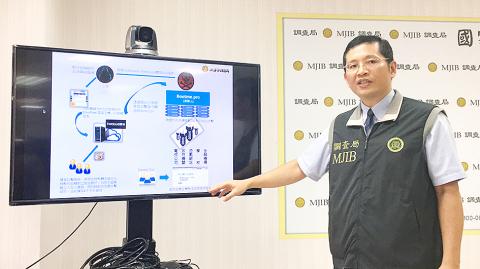A young man, surnamed Chung (鍾), has been identified as the alleged hacker behind a series of attacks on the Ministry of Justice’s Investigation Bureau, the Presidential Office, Chunghwa Telecom Co (中華電信) and the central bank, the bureau said yesterday.
Investigators believe Chung has launched distributed denial-of-service (DDoS) attacks and uploaded the videos of those attacks to YouTube, the bureau’s Taipei office said.
Chung’s motive is apparently to advertise his hacker-for-hire Web site, TDDoS.pw, which he set up with Poland-based hackers in February and has since attracted more than 2,000 members, the bureau said.

Photo: CNA
The Web site bills itself as the most powerful DDoS attack service provider in the nation, and performs cyberattacks and stress testing for users who pay with bitcoin, the bureau said.
On Monday, investigators questioned Chung at his residence and seized an unspecified number of devices, the bureau said.
Data extracted from his computer showed that Chung has carried out more than 20,000 attacks on networks worldwide, including government offices, online gambling firms and financial holding companies, the bureau said.
Since many of the attacks were staged as proof of ability, they tended to occur late at night and the duration was less than a minute, it said.
As a result, many institutions allegedly targeted by Chung were unaware that their network services had been disrupted, it added.
Five people are being investigated on suspicion that they hired Chung to carry out cyberattacks, it said.
The bureau urged government agencies and private companies to improve their protection against DDoS attacks.

Tropical Storm Gaemi strengthened into a typhoon at 2pm yesterday, and could make landfall in Yilan County tomorrow, the Central Weather Administration (CWA) said yesterday. The agency was scheduled to issue a sea warning at 11:30pm yesterday, and could issue a land warning later today. Gaemi was moving north-northwest at 4kph, carrying maximum sustained winds near its center of up to 118.8kph and gusts of 154.8kph. The circumference is forecast to reach eastern Taiwan tomorrow morning, with the center making landfall in Yilan County later that night before departing from the north coast, CWA weather forecaster Kuan Shin-ping (官欣平) said yesterday. Uncertainty remains and

SEA WARNING LIKELY: The storm, named Gaemi, could become a moderate typhoon on Wednesday or Thursday, with the Taipei City Government preparing for flooding A tropical depression east of the Philippines developed into a tropical storm named Gaemi at 2pm yesterday, and was moving toward eastern Taiwan, the Central Weather Administration (CWA) said. Gaemi could begin to affect Taiwan proper on Tuesday, lasting until Friday, and could develop into a moderate typhoon on Wednesday or Thursday, it said. A sea warning for Gaemi could be issued as early as Tuesday morning, it added. Gaemi, the third tropical storm in the Pacific Ocean this typhoon season, is projected to begin moving northwest today, and be closest to Taiwan on Wednesday or Thursday, the agency said. Today, there would likely

DISRUPTIONS: The high-speed rail is to operate as normal, while several airlines either canceled flights or announced early departures or late arrivals Schools and offices in 15 cities and counties are to be closed today due to Typhoon Gaemi, local governments announced last night. The 15 are: Taipei, New Taipei City, Taoyuan, Tainan, Keelung, Hsinchu and Kaohsiung, as well as Yilan, Hualien, Hsinchu, Miaoli, Chiayi, Pingtung, Penghu and Lienchiang counties. People should brace for torrential rainfall brought by the storm, with its center forecast to make landfall on the east coast between tonight and tomorrow morning, the Central Weather Administration (CWA) said. The agency issued a sea warning for the typhoon at 11:30pm on Monday, followed by a land warning at 11:30am yesterday. As of

CASUALTY: A 70-year-old woman was killed by a falling tree in Kaohsiung as the premier warned all government agencies to remain on high alert for the next 24 hours Schools and offices nationwide are to be closed for a second day today as Typhoon Gaemi crosses over the nation, bringing torrential rain and whipping winds. Gaemi was forecast to make landfall late last night. From Tuesday night, its outer band brought substantial rainfall and strong winds to the nation. As of 6:15pm last night, the typhoon’s center was 20km southeast of Hualien County, Central Weather Administration (CWA) data showed. It was moving at 19kph and had a radius of 250km. As of 3pm yesterday, one woman had died, while 58 people were injured, the Central Emergency Operation Center said. The 70-year-old